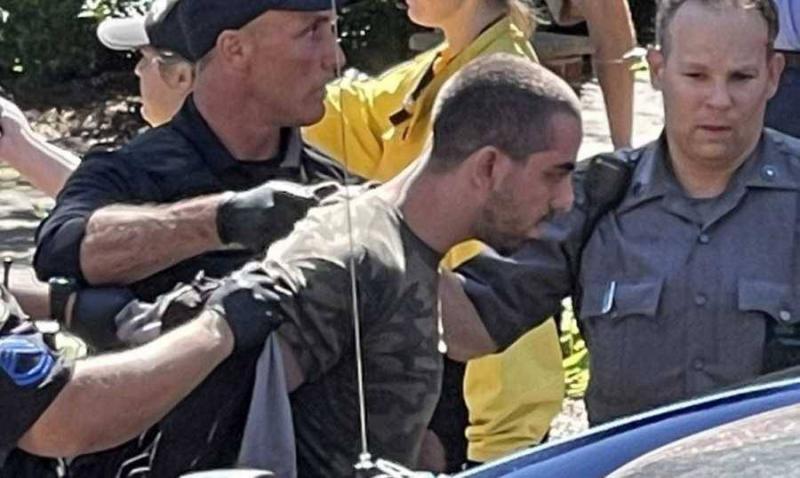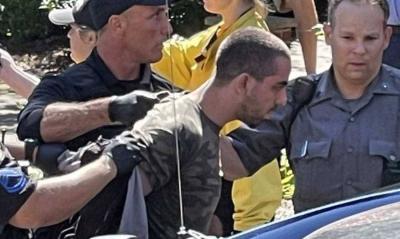Lebanon could not remain a mere "bystander" to the bloody event represented by the stabbing attack on British author Salman Rushdie in the United States. The scene of the incident had not yet settled nor had the fate of the author of "The Satanic Verses," who has been pursued by a 33-year-old fatwa calling for his death from Imam Khomeini, when “the land of the cedars” became the eye of the storm, intertwining humanitarian, political, and religious issues and giving it a global context related to freedom of expression and the fight against darkness.
The stabbings Rushdie suffered in New York soon reverberated in Lebanon, where it was surprising to discover that the assailant had Lebanese roots, prompting investigations into his "origin and lineage." The tracing of the 24-year-old’s background jumped beyond his "family tree" and its roots in southern Lebanon, raising concerns about the potential heavy political ramifications if it turned out that the attack was more than just a "singular act of revenge" and was organized, or if Hadi Matar was politically aligned with the sentiments expressed on his social media pages, which indicated his support for "Hezbollah," Iran, and its Revolutionary Guards.
While the virtual community on various platforms buzzed with "heartbreaking" contrasts about "Lebanon in New York"—from the bright historical legacy left by the only Arab who participated in drafting the Universal Declaration of Human Rights to the dark stigma of linking Hadi Matar to the targeting of a writer who became a symbol of freedom, struggle, and the fight against oppression—questions accumulated regarding the potential "scars" this event may leave in light of what US investigations will reveal. Meanwhile, Lebanon, a "financially devastated" country now "out of the world," cannot afford to destroy what remains of its image as a country embodying human values based on tolerance, coexistence, and the freedom that it "breathes."
Hezbollah distanced itself from the New York attack, with a responsible official telling Reuters, "We have no additional information about the stabbing incident involving Salman Rushdie," announcing that "we know nothing about this topic and, therefore, will not issue any comment." A recorded statement circulated on social media from the party’s Secretary-General, Sayyed Hassan Nasrallah, in which he said, "If some Muslims— and we are all at fault in this matter— now they will call us terrorists, let them, and we will be (liberated) from this subject— if a Muslim executed Imam Khomeini’s fatwa on the apostate Salman Rushdie, those lowlifes wouldn’t dare insult the Messenger of God, neither in Denmark, nor in Norway, nor in France."
Although the date of this recording was not mentioned, a search on the official website of "Islamic Resistance - Lebanon" shows that it was from a speech given on the second night of Ashura in February 2006, commenting on a caricature insulting the Prophet Muhammad (peace be upon him) published in a Danish newspaper, which was later reprinted by Norwegian newspapers amid a protest in the Islamic world.
The Secretary-General began the segment discussing the execution of the fatwa against Rushdie by stating, "The problem started the day Salman Rushdie wrote The Satanic Verses." Meanwhile, while Lebanese security sources indicated that "Washington has not contacted us for information on the suspect" in the attack, the southern town of Yaroun (in the Bent Jbeil district), which is about 125 kilometers from Beirut and situated approximately 800 meters above sea level, became the focus as it is the hometown of Matar and his family.
Mayor Ali Qassem confirmed to Al-Rai that Hadi Matar is from a family in Yaroun "but he was born and lives in the United States," noting that Hadi's father still resides in the town "but he is somewhat isolated socially, so few know him; his mother is in the United States." The mayor did not want to confirm whether Hadi's name appeared on the voting lists or not, "Today is a holiday, and the municipality is closed, so we were unable to review the voting lists," expressing skepticism about reports that Hadi had previously visited Lebanon, "perhaps it was when he was a small child."
He told Al-Rai, "We were surprised by what happened and only learned about it through the media and social media," revealing, "The Lebanese army intelligence (Tebnine office) contacted us as part of following up on the matter." Qassem was quoted in statements to the media saying that "the townspeople follow the news via the media, and none of them know the young man Hadi Matar, and that his father and mother are separated," while the channel "Al-Jadeed" reported that Matar (his father's name is Hassan and his mother’s Sylvana Firdous) "holds Lebanese nationality and is listed on the voting lists and had previously visited Lebanon."
The channel reported that Hadi's mother "contacted her relatives asking them not to disclose any information, as Hadi’s situation in this case is very sensitive," indicating that her son was "provoked by Rushdie’s insult to Islam during the lecture, prompting him to stab him immediately," although the stabbing incident occurred before the lecture began.




